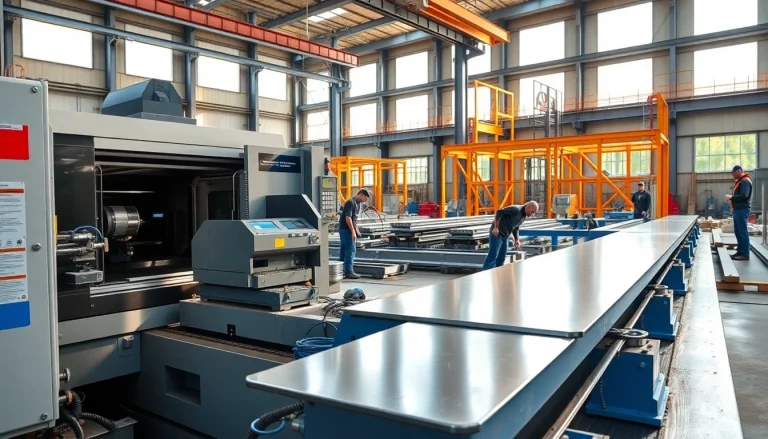
Understanding 24/7 Emergency Truck Repair Services
In the world of transportation, the ability to respond to emergencies promptly can make or break a business. A 24/7 emergency truck repair service ensures that fleets can remain operational regardless of the circumstances. This service is tailored for unexpected breakdowns that can occur at any hour, providing essential support to businesses that rely on trucking. Understanding this concept is vital for fleet owners, transportation managers, and operators who must navigate the demanding nature of logistics and freight services.
What Constitutes Emergency Truck Repair?
Emergency truck repair goes beyond routine maintenance or scheduled fixes. It encompasses a wide array of services designed to address sudden failures that directly affect a truck’s operational capabilities. Typical situations that fall under emergency repairs include:
- Engine failures: Problems such as overheating, oil leaks, or complete engine shutdowns require immediate attention.
- Transmission issues: Trouble shifting gears or unexpected slipping can halt operations, necessitating urgent mechanical intervention.
- Brake system complications: Faulty brakes pose severe safety risks, demanding rapid repairs to ensure the driver’s safety.
- Tire blowouts: A flat or blowout on the highway can be dangerous and needs quick replacement.
- Electrical failures: Battery issues such as dead batteries or problems with the onboard computer system that render the vehicle inoperative.
The Importance of Availability
In a business landscape where every minute counts, being able to access 24/7 emergency truck repair services is invaluable. Availability signifies reliability. Trucking companies must be able to trust that help is just a call away, day or night. Availability also means peace of mind, knowing that regardless of geographical constraints or the complexity of the issue, help is accessible. This trust in a repair service often translates into long-lasting business relationships.
Key Benefits of 24/7 Services
The advantages of having 24/7 emergency truck repair services are multi-faceted:
- Minimized Downtime: The quicker a truck can be repaired, the less impact it has on the fleet’s delivery schedules, thus preserving productivity.
- Enhanced Safety: Addressing issues promptly mitigates risks associated with vehicle failures, protecting drivers and cargo alike.
- Cost-effective Solutions: Fast intervention can prevent further damage, reducing overall repair costs.
- Trust and Reliability: A dependable repair service builds trust with customers, which is crucial for fleet operators.
Common Issues Leading to Emergency Repairs
Understanding the potential issues that can precipitate an emergency repair visit is essential for fleet management. This knowledge allows businesses to implement preventative measures and to respond effectively when emergencies do occur.
Mechanical Failures and Solutions
Mechanical failures can arise from various factors, including wear and tear, lack of routine maintenance, and operational stress. Common mechanical issues include:
- Engine failures: Causes may include inadequate lubrication, overheating, or faulty components. Solutions often require immediate diagnostics, component replacement, or engine overhaul.
- Transmission problems: Signs of dysfunction can include strange noises or difficulty in shifting. Emergency repairs may involve fluid replacement, gasket change, or entire transmission replacement.
Electrical System Problems
Electrical failures frequently stem from battery issues, faulty wiring, or malfunctioning electronic components. These problems can often be resolved by:
- Testing battery voltage and replacing old batteries
- Inspecting wiring for shorts or corrosion
- Utilizing onboard diagnostics for troubleshooting electronic control units
Pneumatic and Hydraulic Failures
Pneumatics and hydraulics are critical systems in many heavy-duty trucks, controlling everything from brakes to lift gates. Common issues include:
- Leaking hoses: Can often be fixed by replacing damaged sections to maintain pressure and functionality.
- Faulty compressors: If a compressor fails, it can bring operational functions to a halt. Quick replacement or repair is necessary.
How to Choose the Right Emergency Repair Service
Selecting an emergency truck repair service involves careful consideration of several factors. Making an informed choice can significantly affect fleet operations and the overall satisfaction of drivers and customers alike.
Factors to Consider
When evaluating potential emergency repair services, consider the following:
- Response Time: A reliable emergency service should be able to respond within a reasonable timeframe, ideally within one hour.
- Service Availability: Ensure the service operates 24/7, including holidays, for true emergency response capabilities.
- Coverage Area: Select a service that covers the geographic locations where your trucks frequently operate.
- Types of Vehicles Serviced: Check that the service can handle your specific types and makes of trucks.
Evaluating Service Quality and Reputation
Service quality and reputation can be evaluated through:
- Customer Reviews: Checking online reviews and testimonials can provide insights into the service’s reliability.
- Referral Checks: Asking for recommendations from peers in the industry can lead you to trustworthy services.
- CERTIFICATIONS: Verify if the technicians are certified to work on different truck makes and models, ensuring they meet industry standards.
Understanding Cost Structures
Lastly, understanding the pricing model is essential for budgeting. Consider:
- Hourly Rates: Understanding labor costs and associated fees that may apply.
- Emergency Call-out Fees: Some services may charge higher fees for emergency responses.
- Parts and Materials: Clarify whether parts are included in the quoted repair price or if they will be billed separately.
Maximizing Efficiency While Waiting for Repairs
While waiting for a service technician to arrive, there are several steps that drivers can take to maximize efficiency and safety during roadside emergencies.
Safety Tips during Roadside Emergencies
Safety should always be the first priority. Here are some essential safety tips:
- Park Safely: Move the truck to a safe location away from traffic to prevent accidents.
- Use Hazards: Turn on hazard lights to alert other drivers of your situation.
- Set Up Warning Triangles: If available, placing reflective triangles can help warn nearby vehicles.
How to Communicate with the Service Provider
Effective communication can expedite the repair process. Consider the following:
- Provide Detailed Information: Share specifics about the truck’s issues, known symptoms, and vehicle condition.
- Location Details: Make sure to give precise information on where the truck is located, including landmarks if possible.
- Request Estimated Arrival Time: Understanding how long the response will take helps in planning logistics.
Best Practices for Preventative Maintenance
Investing in preventative maintenance can significantly reduce the incidence of emergencies. Best practices include:
- Regular Inspections: Consistent vehicle inspections can catch issues before they lead to breakdowns.
- Scheduled Maintenance: Adhering to manufacturers’ recommendations for routine service keeps trucks in optimal condition.
- Driver Training: Educating drivers on how to recognize early signs of mechanical issues can lead to proactive repairs.
Conclusion: Why Timely 24/7 Emergency Truck Repair Matters
Timely interventions and quality repairs are essential not just for keeping vehicles on the road but for maintaining the entire logistics operation. As the demands on the trucking industry continue to evolve, the importance of accessible emergency repair services cannot be overstated.
The Impact on Fleet Operations
Timely repairs can result in improved fleet efficiency and better overall performance. Reduced downtime equates to more deliveries completed on schedule, which enhances customer satisfaction and can improve a company’s reputation.
Maintaining Your Truck’s Longevity
Regular engagements with emergency services for maintenance and repairs can significantly extend the life of the vehicle. Proper repair services that address potential weaknesses before they escalate contribute to the long-term durability of the fleet.
Building a Strong Relationship with Your Repair Service
A strong partnership with a reliable emergency truck repair service builds trust and efficiency. By establishing a long-term relationship with a preferred provider, fleet operators can ensure their trucks receive the best care when emergencies arise.






